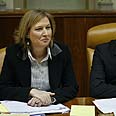

Netanyahu government continues to materialize: The secret talks between the Likud and Kadima parties have been resumed recently in a bid to form a joint coalition, sources in both parties confirmed Friday.
Senior officials in both parties have been discussing this possibility in the past few days. According to the sources, Prime Minister-designate Benjamin Netanyahu and Kadima Chairwoman Tzipi Livni and are aware of these talks and were even involved in some of them.
Netanyahu himself has spoken to senior Kadima officials, but Likud sources clarified that these were not negotiations.
Sources close to Livni said that "essentially, nothing has changed." Reports and rumors about secret talks being held behind the scenes between the two parties were already spread last week. Netanyahu even met with Labor Chairman Ehud Barak in private.
Senior officials involved in the talks said that Netanyahu has yet to present Kadima with a concrete proposal in terms of his government's basic guidelines. Several Likud officials have been calling on their chairman recently to reconsider the possibility of a rotation in the prime minister's role in light of the narrow rightist government taking shape.
Meanwhile, National Union sources said Friday that the Likud has agreed to turn funding for yeshivas into an integral part of the State Budget, after representatives of the two parties met as part of the coalition negotiations.
The negotiations teams met at the Kfar Maccabiah Hotel in Ramat Gan. Following the meeting, National Union officials reported that progress had been made on some of the issues, including the budget for yeshivas.
This decision means that the hundreds of millions of shekels transferred by the State annually to yeshivas and religious seminaries will become a fixed part of the budget, and the parties will not have to negotiate on the subject each year before the State Budget is approved.
'A significant achievement'
It should be noted, however, that making the yeshiva aid a fixed part of the budget may eventually prove problematic for the religious parties, as this clause in the Arrangements Act is usually subject to political pressures every year. When the religious parties are able to exert more pressure, the budget is increased as well.
Now, with the clause secured in the budget law, the government won't be able to substract from it – or add to it. The sources involved in Friday's meeting did not elaborate on the volume of the yeshiva funding in the budget, and this issue is likely to continue to be subject to political dealings.
Knesset Member Uri Ariel, a member of the National Union's negotiating team, told Ynet that "this is a significant achievement and an important change in the attitude towards the aid given to the yeshivot."
The teams will meet against next week to continue to discuss the coalition agreement's details. So far, no understandings have been reached on the manning of the government posts.
National Union demands the Housing portfolio, which has already been promised to Shas, as well as a deputy minister in the Defense Ministry. These two issues have yet to be agreed on, as the Likud has been offering National Union a different portfolio.
The two parties also disagree on the next government's basic guidelines in diplomatic issues and others.
Likud officials expressed their optimism Thursday, saying that Netanyahu would present his new government on Wednesday or Thursday. However, his negotiating team still has to bridge the gaps with additional parties.
Likud and Yisrael Beiteinu representatives will meet again on Sunday to discuss the differences between the parties in the civil marriage issue. The two parties have already agreed that former Minister Prof. Ya'akov Ne'eman will replace Daniel Friedmann as justice minister.
Zvi Lavi contributed to this report















